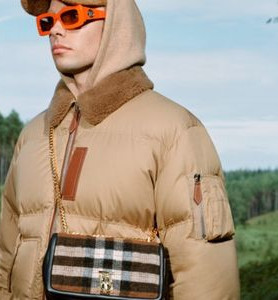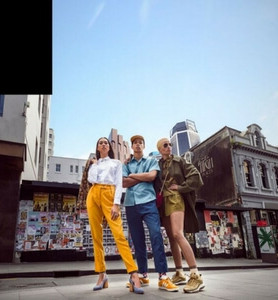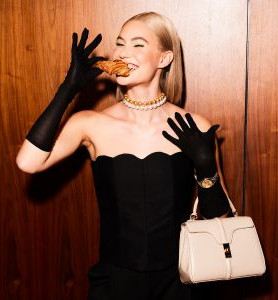Patrick Schwarzenegger talks White Lotus, Saxon, and that audition
The finale of The White Lotus left audiences with three dead bodies, one near-death experience and plenty of plot and character twists and turns. A standout of the show, Patrick Schwarzenegger’s character Saxon was put through the ringer during the season, which was shot in Thailand. The ambitious and vapid young finance bro suffered rejection from the ladies, judgment from his disappointed little sister, lies from his spiralling white-collar criminal dad and an incestuous liaison with his younger brother. However, by the season finale, his vacation crush, played by Aimee Lou Wood, had plied him with spiritual books that may have convinced him that true love was what he should be after. Patrick sat down to talk about his incredible experience making the show, how he navigated the arc of his character, Saxon, and the advice his brother-in-law, Chris Pratt, gave him when he was making his audition tape for the show.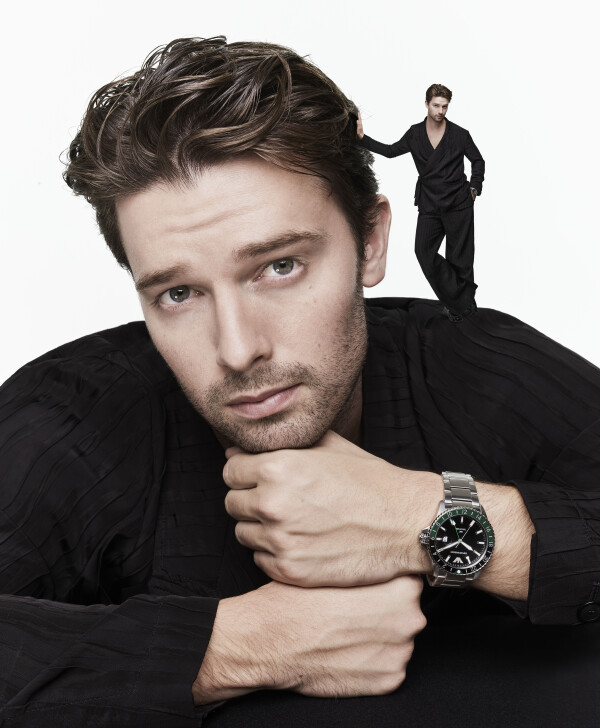
Congratulations on your incredible performance this season. So, what was the first thing you knew about your character Saxon? What was the first thing you read about him? And did you talk to Mike White first?
So with this, with the first two seasons being as successful as they were, they were being very discreet about this season. I got it in my inbox right after the writers’ and the actors’ strikes ended. Maybe a couple of weeks later, I got the audition, which was labelled ‘The Secret Garden’, which came into my inbox. And I was like, ‘Okay.’ And then I saw, ‘Written and directed by Mike White, and I was like, ‘Okay. This is obvious. It’s White Lotus.’ And there were no scripts. I mean, they had finished scripts, but they didn’t let us read them. It was just three audition scenes and a one-sentence logline about Saxon. There was nothing about the story of the season, the arc, or anything. He was a Southern finance bro who worked under his father—and was a complete flirt. I think that was the logline, something along those lines. And so, I got the three audition scenes. I read them, and I had no context. So one of the first audition scenes was episode one, where I’m lying in bed with my brother. But at that time, I still didn’t even know he was my brother. And I’m talking about how this person is so hot, and she’s obsessed with Buddhism and all of this different stuff. And I had zero idea that I was talking about my sister [laughs], because I had no context for it. And, afterwards, when I got the script, I was like, ‘This is insane that that audition was about saying how hot my sister was!’ [laughs] ‘You’re nuts!’ But I think, looking back on it, I was trying to think about why they did that. And I think one of the reasons was that they didn’t want the scripts to go out. They didn’t want people to publicise what would happen in the season. But two, I think that Mike and then Meredith Tucker, the casting director, do this process strategically, where they only give a little sliver of the character. They want to see what you bring to it, your ideas, how you interpret the audition scenes, and how you make it your version. Because Mike is very opinionated about what he wants, he’s very collaborative and allows you to bring your own version of it. So, the audition, I remember my brother-in-law [Chris Pratt] said, ‘Hey, the first couple seconds of the audition tape the casting director is going to watch, and they’re going to know that he’s right for the role, or he’s the right vibe. Let me watch the rest of his tapes. Or sometimes, unfortunately, they’ll watch the beginning of it and be like, ‘No’. And then they’ll pass.’ Because they’re watching so many scenes. So he said, ‘You’ve got to do something unique and different.’ So I did the self-tape, and the first five to ten seconds of it, I walked up to the camera and just eye f--ked the camera. And I just started flirting with the camera, smiling and smirking and going like this and that. And then the three ladies come from the other side, and I turn over to them and say, ‘Ooh, cougars.’ And then I go and I take my attention to them. They thought that was so funny that I just made the camera a character because all I knew then was that he was a flirt. So I was just playing this, I don’t know, horny flirt guy. Yeah. That’s all I knew about the project at the time.
time.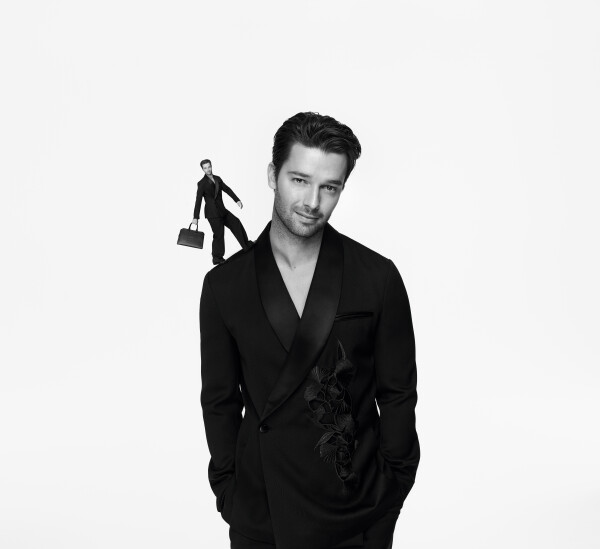
Horny flirt guy—that’s such a great description?
I know. It sounds so ridiculous. But I didn’t know where the character was going to go. And that was once I started to read the scripts. As I’ve said before, my biggest worry was that it would come off as just one note. And I was nervous about playing this over-the-top character of a finance douche-y guy, because I was just like, ‘It’s fun, but it’s not that interesting.’ And I should never have doubted Mike’s writing. And then as the story went on and I saw where there could be potential arc moments and shifts for him in body language and in just his demeanour with the relationship with his siblings and with the ladies, the other girls, and just how the events in episodes five and six were a significant turning point for my character.
You do so much physically; the way he walks, his gait, and the way he just carries himself are so specific from the beginning until the end. And you see this guy who’s untouchable to watching yearning, sadness, confusion, and complexity. Tell us about that?
Yeah. There are moments when I always try to figure out, like, ‘How can I make this character this character while he’s not having words?’ That was what was important to me. And, I’m so happy Mike let me take some shots at doing things I was nervous about. I thought maybe it’d be too much or whatever.
Like what? What did you think would be too much?
Like episode one, when I’m getting out of the pool. It’s just written as he walks over to his chair, and he starts saying, ‘God, like, these long plane rides make me so horny.’ And I was like, ‘You know what, Mike? Is it fine if I go out of the pool, stop, look at Chelsea, and adjust myself?’ And he was like, ‘That’s f--king hilarious.’ And I was like, ‘Okay. And is it fine if I’m on the pool bed, like, lying, and I’m kind of touching myself?’ This is the guy who’s always constantly adjusting himself. And he was like, ‘It’s perfect. It’s perfect.’ And so that was one example. Another example is at the end of episode one, my idea to be naked caused the whole uproar. And Mike always wanted it when he was in the bathroom to be naked and to have this scene where he’s looking at the p-rn, god, this conversation is so... without context [laughs]. So there is this scene... and I just said, ‘You know what? It will show a power dynamic between him and his little brother.’ Saxon doesn’t care about anybody else. He doesn’t have any regard for someone else in the room. It’s his room, whether someone’s staying in it or not. He would sleep naked, walk to the bathroom, and have the iPad in his hand on the side. It wouldn’t be covering himself, and he wouldn’t scurry to the bathroom. He’d power walk to the toilet.’ And Mike was like, ‘Okay. If you’re comfortable with it, blah blah.’ And I was like, ‘Yeah. I think that’s a good idea.’ And so we did that. And then the other thing that Mike would always say, like, in the beginning, I was walking, we had scenes where I was walking, when we got off the boat, even in the beginning. And I kind of just had a regular walk, and I got out and I just would, and we walked, and he’d be like, ‘You don’t look rich! You don’t look rich!’ Like that. He would yell from over the camera. And he’d walk up to me and go, ‘You’ve got to walk richer! You’ve got to walk richer!’ And I was like, ‘Okay.’ He’s like, ‘Aren’t you rich in real life? Walk rich.’ And I was like, ‘Okay. Okay.’ And then afterwards, I did it with the glasses on, and then I’d walk like this. And it was almost the strut of a model, where he had this bounce to him, and the shoulders were back. And Parker was so obsessed with that. She always asked, ‘What part of his body does he lead with?’ And I was like, ‘That’s right.’ And so it was always like that. And so those are just fun physicality things. Or at breakfast, there was a tiny part where I just would sit and my family’s talking, and I would just be flexing my pecs and watching myself and stuff. Or they had a scene with the lady boy that came up, and Mike thought it was so funny because then I put my chair back, and I checked the lady boy out, and then I was kind of disgusted. He just let me do what I thought would be funny, and then, other times, he’d reel you in and say, ‘No, no, no it’s too much.’ But I think the physicality and the wardrobe and the hair—every part makes a character. So we tried to build this character from multiple different angles.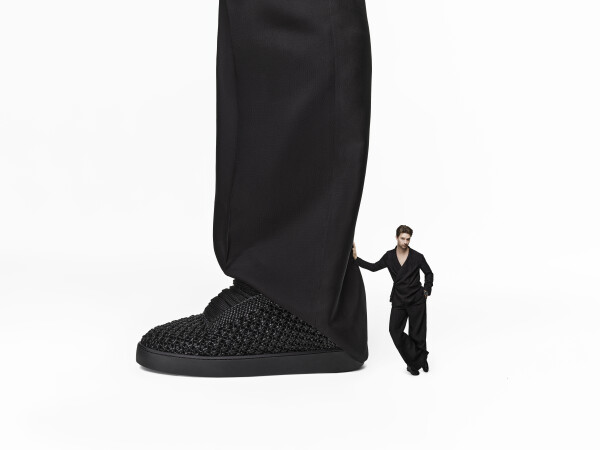
The season was shot out of order, right? How is that for you as an actor, especially when your character goes on a specific journey, to have to be in a completely different emotional place from one scene to the next?
Yeah. So my first day was episode one, getting out of the pool. The second day was episode eight, the finale of me walking over to Chelsea with her book, and she runs into Rick’s arms. And I turn my head back, and I see her. Right?
Which is a great moment?
It’s a beautiful moment. It’s a really beautiful moment. And it’s everywhere that moment, which is so funny because when we did the scene—and this is just a great example of how great and how important it is to have a great director and writer and stuff— was I thought about what you just said when I was filming that. I was like, ‘Okay. This is the end. This is my last real scene, besides the piña coladas and some other stuff. But it’s my last scene. This is a great end-of-the-arc moment. This is a moment that I should go, and I’m going to play with these girls, and I’m going to be super sweet and flirty.’ And I did it on the first take. And Mike came over, and he was like, ‘You’re too nice. You’re being too nice.’ And he was like, ‘Maybe let’s just be a little bit more standoffish and you’re nice because you’re not saying one of your normal things, but don’t be too nice. And maybe just throw in a line about the book. Maybe say, the sex stuff was pretty interesting. That will be more Saxon.’ And I was like, ‘Okay.’ And he goes, ‘And then all I want to do is I’m going to put a camera here. And I’m going to have you turn, and I just want to watch you watch Chelsea jump into Rick’s arms. And I’m just going to have a camera stay there for 20 to 30 seconds, and that’s the moment that the audience realises you might change.’ And I said, ‘Okay. Got it.’ And so we did the scene. I walk in and say, ‘Yeah, you know, the sex stuff was pretty interesting. It’s great.’ And then she goes, looks, runs over, and then it’s that. And then he’s just visualising her, and then that was it. It’s just me watching her, and then he wanted just to see the moment that, ‘Wow. Maybe I want that. Maybe I want a real relationship, or maybe I want something that she has, and maybe I’ve been wrong. Or maybe it’s not all about just women, women, women, women and one-night stands, all this. It’s about something more.’ And she signifies and she embodies that. And so he just left the camera there for what felt like an eternity, but it was just a couple of seconds, and that was the scene. And watching it in the final cut, it’s a beautiful moment because there are no words, and it’s just a very slight from a smile enjoying the moment there to just kind of like, ‘Wow. That’s beautiful over there.’ So it’s more of an internalised moment. That was the second day we shot that. It’s kind of weird.
There are a few moments when Mike holds the camera on your face, like when Chelsea says, ‘you’re soulless’. Also, you can see Saxon’s brain when he’s trying to process what happened with his brother the night before. Your performance is so great because you don’t have the luxury of a line to convey what he is experiencing in that moment. As an actor, is that scary or thrilling? What did you think when you saw the final takes?
So the scene by the pool when they say that, ‘You’re soulless’ and the whole thing where the two girls tell me what happened the night before was one of my audition scenes. And it ended up being pretty different from what we did during the audition, but it was fun. The nerve-wracking and scary scenes, as an actor, are usually the ones that are the ones that you look back on and you’re the happiest or most proud of or that you like the most because it challenges you and it puts you in a different kind of state. And, yeah, they’re the scenes that bother you the most before shooting. You’re always thinking about them, worrying about them. But those were some of my favourite scenes, and it just worked so well because he wrote of who this character was at the start, and just watching him quiver and his ego getting destroyed in front of these girls. It’s just a nice turn. And it’s funny to watch someone like Saxon just melt in their chair and not know what to do and not know how to react and trying to deny it, but they’re both there saying it. And it’s a significant power shift. It’s a big change—he’s the one always asking the girls questions, he’s the one always saying stuff, ‘This, this, this.’ And then now they’re coming at him, and he’s not used to that. And, he has nowhere to go with it. And so it’s just a moment that Mike wanted to see of, again, moments internalised, but it’s almost like you’re trying to laugh it off and you don’t know what to say and can’t say anything. And then it’s like, ‘Okay. Let’s just forget about this,’—and then he goes away. It was a fun scene to film. It was great.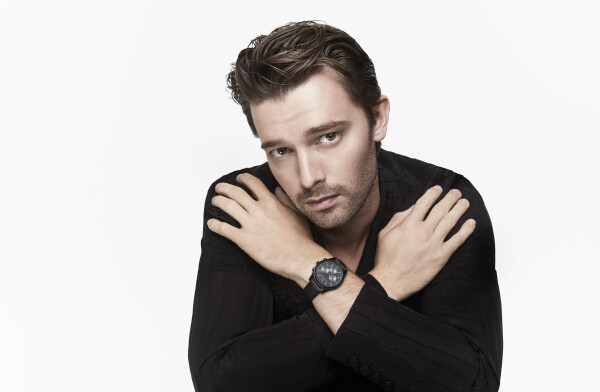
When you watch the series, we know the whole cast watched the finale together and everything. Was there something that you observed in how Saxon was assembled from these takes that you were surprised by, or were you like, ‘Oh, I have this different insight into him now?’
Watching it from the start to finish, yeah. There are more humanising moments and more reasons to enjoy and like him by the end than I thought there would be. I was surprised how much people initially hated him, and then I was surprised how much people liked him. When you’re filming over seven months, you get a little bit lost in it, and you’re doing things so out of order, and then you don’t film for a week, and then you go back, and you do this and that. You’re kind of just showing up and doing the work that day. Sometimes it’s hard to remember how it will all play out. And then you just really have to trust Mike and his writing and his choices. But, yeah, I was watching it, I was surprised and I was also surprised how—again I don’t know how biased I am and how attached I am to this project—of how emotional I got during the end, even with my scenes, so it’s hard for me to say as an unbiased viewer. I guess I was surprised at how maybe emotional it was or how much I rooted for specific characters, and myself. You feel like you know these people weirdly by the end. And that’s what happens when you have 10 hours of footage you’re watching. It’s a lot. And you start to, especially with this show, I mean, the number one critique is that it’s slow. But it’s slow because a lot of it is just conversations. It’s real dialogue between these people that helps build the characters and show you who is who, who they are, and who they thought they were—and then sh-t ensues.
Finally, you said earlier that your brother-in-law gave you a great tip about the first two seconds of a taped audition. What is the other single piece of advice you have about acting?
I mean, that was great advice from his side. I mean, I’ve done auditions where I take a swing in the beginning and don’t hear back [laughs]. But I do understand what he’s saying about they do know in the beginning. I had another casting director who told me that when you walk into the audition room, you should be in the character. And from how you dress to how you’re sitting, your physicality. If you’re going in with that intention of being that character, the casting director knows. But one of the things was that it was on that second day of filming with Walton. I don’t have many scenes with Walton Goggins. I have a couple. And we were kind of talking after the scene, and I was sitting there, and I asked him, ‘Does he get nervous?’ Because I get nervous with public speaking or with some scenes, and certain things. It’s just that I can’t control it. I get nervous. And I said, ‘Do you get nervous?’ And he was like, [does Walton Goggins voice] ‘Yeah. Yeah. Yeah. Yeah. Yeah. Yeah.’ And I was like, ‘Yeah.’ And then he might have poked my chest, and he was like, ‘But I never f--king question my process and my work, and I’m the one for this role.’ And I was like, ‘Wow.’ And that was it. And I was like, afterwards, it just kind of made me think that it’s okay to be nervous, but the confidence and how confidence equals competence a lot of the time. And as actors, if you’ve done scenes, whether it’s on stage or it’s in tapes or when you’re with the director and stuff, a lot of the times when I perform a scene or I take a swing in the back of my head, I right away think, ‘F--k. Is he going to like that? Is he not? Was that right? Was that good?’ There’s that voice inside your head that’s constantly kind of doubting yourself. I mean, we all do it in life. Right? It’s always kind of fear and fear of failure and stuff, and it’s easier said than done to be confident. But what he reminded me there was like that, and I have my stuff in my head of why I get cast for stuff or why I got this role, whatever. And it was just the fact that he said, ‘I just go out there and I f--king I know what I’ve done ahead of time in my process and my work, and that when I show up there on the day, I’m the one for this f--ing job. And I act like it. I get nervous, but I know that I’m the one.’ It’s just a confidence boost of going into it. I don’t know.
Well, you definitely were one for the job!
Thank you.
Thank you!
Photographed by Julien Martinez Leclerc for Emporio Armani



